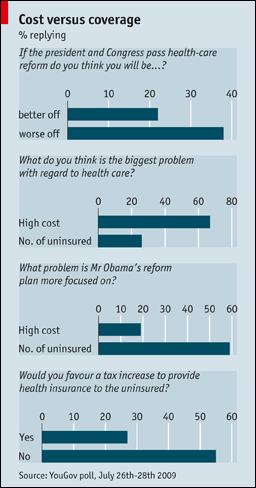Health Care reform: shifting sands
Watch the bouncing ball. In an earlier post I cautioned my gentle readers to keep your eye on the ball. A difficult task.
What is the goal?
The goal started with a political strategy and calculation based on a lofty ideal. Cover everybody. It is becoming clearer to more people that coverage alone does not guarantee access nor quality. Does universal coverage remain the goal? Or universal access? At what cost?
Now the debate shifts even more subtly to insurance reform. That is probably where the debate should have started. Remember, I cautioned in some previous posts that the insurance giants and Big Pharma will not lose. They are the Titans that no one wanted to challenge.
The debate has been an economic formulation. I have cautioned this can be a zero-sum game. More people, more coverage with an ever-increasing federal deficit demands either increased revenues or … decreased services.
Unless, of course, we begin to talk about a paradigm shift. That is not in evidence. We are talking around the margins — preventive services.
Anti-aging and Longevity medicine is the paradigm shift.
Let us wrap up the week’s economic focus.
But first let’s dispense with the political sideshows — or freak shows. No one is suggesting putting people out to pasture. Insurance companies are already denying you care. That’s the goal. Deny coverage.
Here is a synopsis of the recent editorials and interviews with some of the more thoughtful observers.
From an OpEd in the Wall Street Journal, Roger Altman, of the Clinton Administration, explains why deficits matter and how this will affect proposed Health Care proposals and spending.
Only five months after Inauguration Day, the focus of Washington’s economic and domestic policy is already shifting. This reflects the emergence of much larger budget deficits than anyone expected. Indeed, federal deficits may average a stunning $1 trillion annually over the next 10 years. This worsened outlook is stirring unease on Main Street and beginning to reorder priorities for President Barack Obama and the Democratic congressional leadership. By 2010, reducing the deficit will become their primary focus.
Why has the deficit outlook changed? Two main reasons: The burst of spending in recent years and the growing likelihood of a weak economic recovery. The latter would mean considerably lower federal revenues, the compiling of more interest on our growing debt, and thus higher deficits. Yes, the President’s Council of Economic Advisors is still forecasting a traditional cyclical recovery — i.e., real growth of 3.2% next year and 4% in 2011. But the latest data suggests that we’re on a much slower path. Probably along the lines of the most recent Goldman Sachs and International Monetary Fund forecasts, whose growth rates average about 2% for 2010-2011.
He followed up with an interview with Charlie Rose. A highly enlightening and sobering discussion of financial limits and why deficits will matter to Main Street and Wall Street (current irrational market exuberance notwithstanding).
David Brooks writes in the New York Times:
The C.B.O. measured the plans, and the results were devastating. A successful plan has to be revenue-neutral for the government over the next 10 years, and it has to reduce the total health care burden over the long term so the country doesn’t go bankrupt. The Senate committee plans failed both criteria. They would cost the government more than $1 trillion this decade and send total health care costs zooming at least twice as fast as the economy as a whole…
Health care reform is important, but it is not worth bankrupting the country over. If this process goes as it has been going — with grand rhetoric and superficial cost containment — then we will be far better off killing this effort and starting over in a few years. Maybe then there will be leaders willing to look at the options staring them in the face.
An OpEd Aug 1-7 edition of The Economist chides:
As The Economist went to press, hopes were rising that the Senate finance committee might soon produce a bipartisan version of the health bill. But then the final version of that bill will have to be reconciled with the much-worse House version. If the result is another lazy deficit-boosting, hard-decision-avoiding scheme (like George Bush’s rotten Medicare bill), what president would want to be remembered for that? Mr Obama remains an inspiring figure. But he needs to get his hands dirty this summer if he is to rescue a presidency that has started to slip.
And look at this graphic from YouGov featured in the Economist What Now for Obamacare:

A good discussion on the Chris Matthews Show. They all seem to agree that Health Care will be passed. At what cost? For political currency?
More in a few days … we turn to some other provacative subjects … thyroid supplementation.